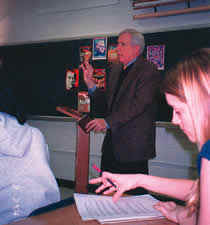
Wolf Visits HHS Class

Wolf Visits HHS Class

Jackie Allder
Herndon Observer Staff Writer
U.S. Rep. Frank R. Wolf (R-10) attended Doug Graney's U.S. history class at
Herndon High School on Monday, Feb. 2, to participate in a discussion on the
nation's founding documents.
Graney's students had prepared questions about specific portions of the
Declaration of Independence and the U.S. Constitution, which they asked the
congressman.
Wolf, who is in his 12th term in Congress, is very familiar with U.S. history,
especially the records that created his job. Wolf talked about the signing of
the Declaration of Independence, quizzing the students as he went along.
Wolf said that 56 people signed the Declaration of Independence and that roughly
one-third of those people suffered because of it, losing their businesses or
even their families. Wolf said that even the gravity of those losses did not
cause any of the original signers to change their minds about it.
As the signers of the Declaration of Independence did what they thought was
right, Wolf said about his voting policies, "I vote what I think is right."
He talked about the Edmund Burke theory, which follows that representatives
should listen to their constituents but are not bound to follow what the
constituents say. "My conscience takes me where I go," Wolf said.
Wolf is involved in foreign affairs and has visited Iraq and other parts of the
Middle East several times, and he answered questions about the war in Iraq.
"Whether you agree or disagree, it's to help people," he said. He referenced his
recent visits to Ethiopia and the changes that have come from United States
involvement in the country.
Wolf, however, distinguished between involvement in foreign affairs and a
declaration of war by explaining what happens when Congress declares war.
Wolf said there are serious "political, economic and legal ramifications that
result from declaring war." Progress that could have been attained in a similar
effort would be seriously impeded if there was a declaration of war.
Student Nawrin Ahmed gave Wolf a petition against the requirements for
presidency. Ahmed said the Constitution allows only U.S.-born citizens to become
president. She said she moved to the United States when she was two and has
become a U.S. citizen, but will not be allowed to be president.
Wolf said the founding fathers probably wrote that portion of the Constitution
to keep someone from England from running for president.
Several years ago, Rep. Richard Gephardt (D-Mo.) visited Graney's class and
discussed the difficulties he experienced passing bills in Congress. Wolf said
he has not had any trouble getting bills passed. However he said, the system "is
meant to be slow, but I think it can be steady and sure."
Wolf said the founding fathers did not want the system to be too fast-paced and
therefore put in a series of checks and balances. "By the end, something better
actually comes out than at the beginning," he said.
Wolf said he understands the importance of guiding youth.
He has held discussion groups for area students at schools and at his office on
Capitol Hill. In another effort to help students, he recently secured funds for
school systems in Northern Virginia to use to combat gangs.
Copyright © 2003 The Herndon Publishing Company